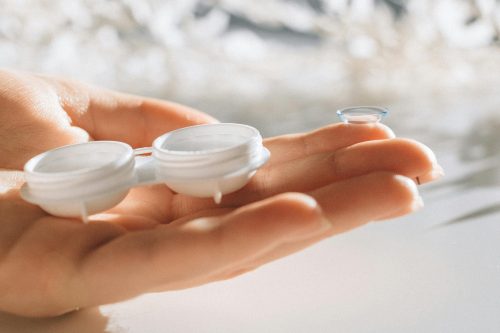Contact lenses provide a convenient alternative to glasses for vision correction. At Collins Eye Center, we offer various types of contact lenses to address different eye conditions and style preferences. With so many options, choosing the right lenses can be challenging without professional guidance. Our eye doctors help determine the optimal contact lenses for your needs. Here are five types of contact lenses we offer and how our eye doctors select the most suitable option for you.
Rigid Gas Permeable
Rigid gas permeable (RGP) contact lenses are durable lenses that allow oxygen to pass through, promoting eye health. At Collins Eye Center, we provide RGP lenses that offer sharp vision correction for various refractive errors. These lenses are a good option for people with astigmatism or those who prefer a long-lasting, comfortable fit.
Soft Contact Lenses
Soft contact lenses comprise flexible plastics known as hydrogels that conform to the eye shape, providing a comfortable fit. These lenses are permeable, allowing oxygen to pass through to the cornea when worn.
Daily Lenses
These are single-use lenses, which you discard after one day of wear. Your eye doctor may recommend daily lenses if you are prone to allergies or eye infections. Because you wear them once, you do not need to clean them, which is convenient if your schedule does not allow for lens care.
Hybrid Lenses
Hybrid contact lenses combine the benefits of rigid gas-permeable and soft lens technologies. At Collins Eye Center, we offer hybrid lenses designed for comfort and clear vision. The central rigid portion provides sharp vision correction, while the surrounding soft lens material enhances comfort and fit. Hybrid lenses are ideal for people with astigmatism or those who need both excellent vision and comfort.
Multifocal Lenses
As you grow older, your eyes’ lenses may become less elastic, affecting their ability to switch focus when viewing things at different distances. You can correct this condition, known as presbyopia, by wearing multifocal lenses. These lenses have two or more fields of vision that allow you to correct your vision at different distances, allowing for a smooth transition between viewing zones.
Scleral Lenses
These lenses are ideal if you have irritable eyes, dry eyes, or issues with your cornea. Because of their large diameter, the lenses vault over the cornea and rest on the white part of your eye, known as the sclera. The lenses create a tear-filled reservoir between the lens and cornea, keeping your eyes moist.
How Your Eye Doctor Determines Your Lens Prescription
When you visit our clinic for a lens prescription, we perform several tests to identify your visual needs and select appropriate lenses. We conduct near-vision testing to assess how well you see objects at various distances. Retinoscopy helps us evaluate how light reflects off your retina, and a binocular vision test shows how well your eyes work together.
After determining your vision correction needs, we proceed with a contact lens exam to find the optimal fit. Your optometrist uses a corneal topographer to measure the size and curvature of your corneas and check your pupil size. These measurements help in selecting the correct lens size. We will evaluate your tear film to make sure you can comfortably wear contact lenses. If you have dry eyes, we may recommend alternatives to avoid exacerbating the condition.
Book a Contact Lens Appointment with your Eye Doctor
Contact lenses come in various designs to address different visual needs, making an eye exam a key part of your eye care. At Collins Eye Center, we perform detailed eye testing to pinpoint your visual requirements and the most suitable corrective solutions. After the assessment, your eye doctor will provide a trial pair of lenses to gauge comfort and effectiveness. Contact us today to schedule an appointment with our optometrists for a personalized contact lens fitting.


